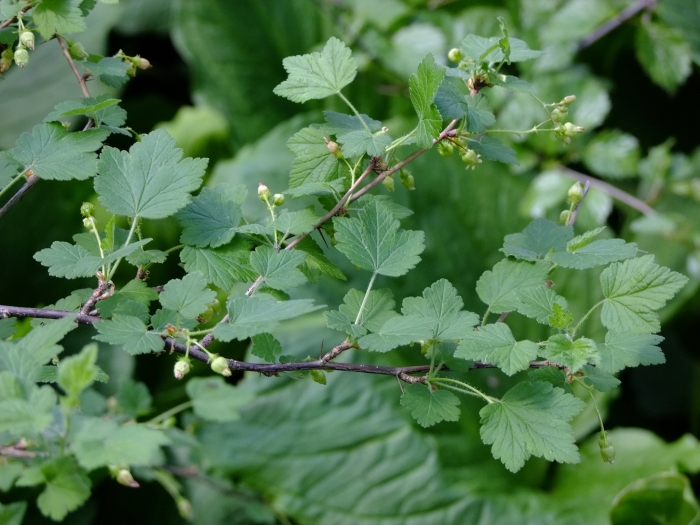Wild Gooseberry
(Ribes hirtellum)
Wild Gooseberry (Ribes hirtellum)
/
/

Summit Metro Parks
CC BY 4.0
Image By:
Summit Metro Parks
Recorded By:
Copyright:
CC BY 4.0
Copyright Notice:
Photo by: Summit Metro Parks | License Type: CC BY 4.0 | License URL: http://creativecommons.org/licenses/by/4.0/ | Rights Holder: Summit Metro Parks | Publisher: iNaturalist | Date Created: 2009-05-03T11:27:38-07:00 |

























Estimated Native Range
Summary
Ribes hirtellum, commonly known as wild gooseberry, is a deciduous shrub native to various habitats including open woodlands, forest edges, and rocky openings in eastern North America, from Alberta to Nova Scotia, and south to West Virginia, extending west to Nebraska. It thrives in areas with moist soils, often found near wetlands and riverbottom forests. This species typically grows to 2-4 feet in height and width, with arching stems covered in fine hairs, giving rise to one of its common names, hairy-stem gooseberry. The plant produces small, greenish to pinkish flowers in the spring, which are not particularly showy, followed by edible, spherical berries that turn from green to purple as they mature.
Wild gooseberry is valued for its fruit, which can be used in culinary applications, and for its resistance to American gooseberry mildew, a trait that has been utilized in breeding programs to develop resistant cultivars like ’Houghton’. It is often used in naturalistic plantings and as part of wildlife gardens, where its berries provide food for birds and other animals. In cultivation, Ribes hirtellum prefers partial shade to full sun, moist well-drained soils, and is relatively low-maintenance once established. It can be propagated by cuttings or seeds.CC BY-SA 4.0
Wild gooseberry is valued for its fruit, which can be used in culinary applications, and for its resistance to American gooseberry mildew, a trait that has been utilized in breeding programs to develop resistant cultivars like ’Houghton’. It is often used in naturalistic plantings and as part of wildlife gardens, where its berries provide food for birds and other animals. In cultivation, Ribes hirtellum prefers partial shade to full sun, moist well-drained soils, and is relatively low-maintenance once established. It can be propagated by cuttings or seeds.CC BY-SA 4.0
Plant Description
- Plant Type: Shrub
- Height: 1.75-3.25 feet
- Width: 3-4 feet
- Growth Rate: Moderate
- Flower Color: Pink, White
- Flowering Season: Spring, Summer
- Leaf Retention: Deciduous
Growth Requirements
- Sun: Full Sun, Part Shade
- Water: Medium
- Drainage: Fast
Common Uses
Bee Garden, Bird Garden, Edible*Disclaimer: Easyscape's listed plant edibility is for informational use. Always verify the safety and proper identification of any plant before consumption., Low Maintenance
Natural Habitat
Open woodlands, forest edges, and rocky openings in eastern North America
Other Names
Common Names: Wild gooseberry, Hairy Gooseberry, Hairy-Stem Gooseberry, Wedge-Leaf Gooseberry
Scientific Names: , Ribes hirtellum, Grossularia hirtella, Grossularia hirtella var. calcicola, Grossularia saxosa, Ribes hirtellum var. calcicola, Ribes hirtellum var. hirtellum, Ribes hirtellum var. inerme, Ribes hirtellum var. saxosum, Ribes oxyacanthoides var. calcicola
GBIF Accepted Name: